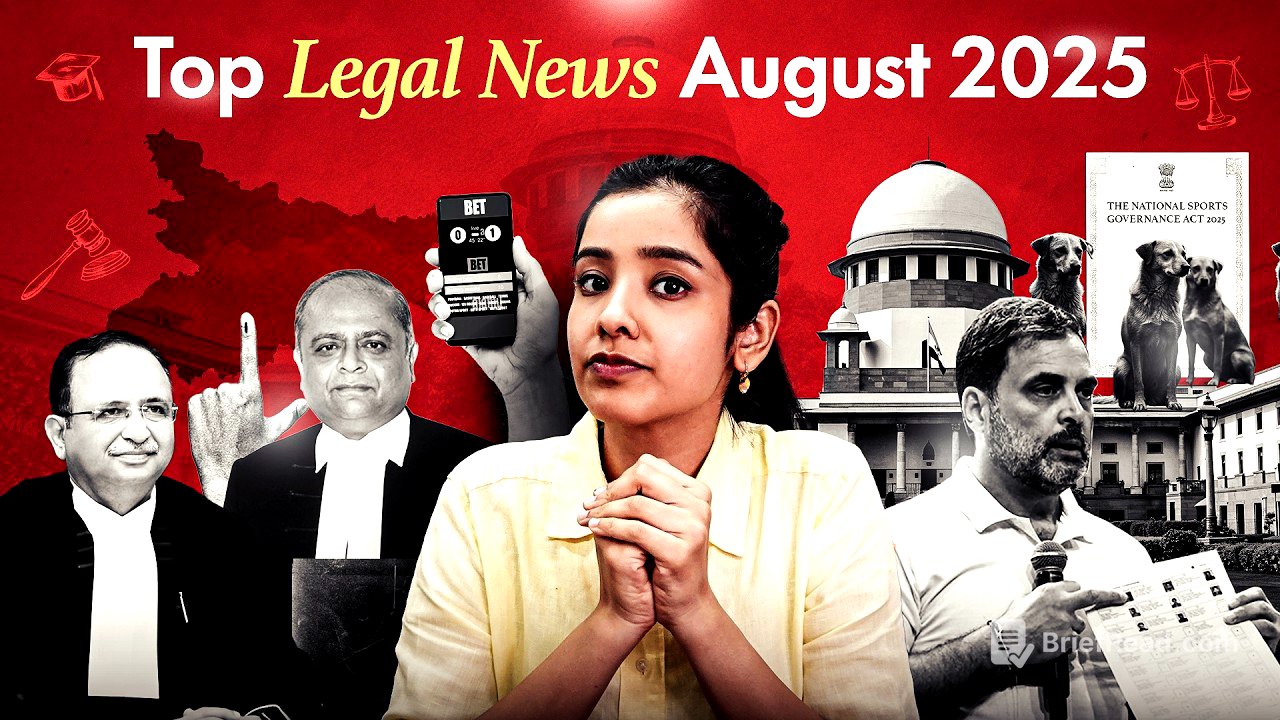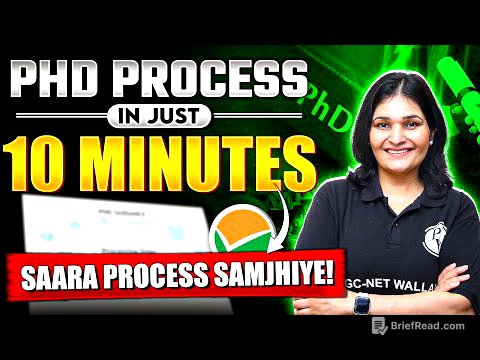TLDR;
This video provides a concise overview of significant legal updates and judgments from August 2025. It covers a range of topics, including revisions to Bihar's voter list, allegations against Rahul Gandhi regarding election irregularities, Supreme Court orders related to street dogs, regulations on online gaming, governance of national sports, the death penalty, and the elevation of Supreme Court judges.
- Revisions to Bihar's voter list and the Supreme Court's directives.
- Allegations against Rahul Gandhi regarding election irregularities.
- Supreme Court orders related to street dogs and animal birth control rules.
- Regulations on online gaming and the reasons behind the ban on real money games.
- Governance of national sports and the measures taken to ensure transparency and accountability.
- The death penalty, including the stages and processes involved from sentencing to execution.
- The elevation of Supreme Court judges and the controversy surrounding the collegium system.
August 2025 Legal News [0:00]
Priya introduces the video as a monthly legal update, promising to simplify important legal news and judgments. The video aims to provide viewers with a clear understanding of various legal topics.
Bihar SIR [0:16]
The Election Commission of India has initiated a special intensive revision of Bihar's voter list, requiring voters to provide valid proof of their eligibility. While Aadhaar is not considered valid, 11 other documents such as birth certificates and passports are accepted. The opposition argues that obtaining these documents is difficult for migrant workers and marginalized communities, potentially leading to their disenfranchisement. The government defends the strict proof requirement as necessary for a clean and transparent voter list. The Supreme Court clarified that the Election Commission has the power to revise the voter list but directed that Aadhaar cards also be accepted as valid proof. The court also mandated a searchable online list of removed voters with assigned reasons for removal and warned that irregularities could lead to cancellation of the revision exercise. This revision exercise will extend nationwide to remove duplicate voters, but mistakes could deprive eligible citizens of their voting rights.
Rahul Gandhi vs ECI [2:33]
Rahul Gandhi alleged that over one lakh suspicious votes were cast in the Mahadevpura Assembly Constituency during the general election, claiming multiple IDs for the same voter and discrepancies in voter information. The Election Commission of India (ECI) refuted these claims as misleading and challenged Gandhi to provide authentic proof or issue a public apology. The ECI requested submission for all the default voters under the Registration of Electoral Rules. Legal solutions are difficult because claims or objections regarding elections must be filed within 30 to 45 days, and the general elections occurred a year prior. The Supreme Court can overturn election results under specific grounds, such as in the Haryana Gram Panchayat elections where a recounting of EVMs reversed the Sarpanch's result.
Street Dog order [5:38]
The Supreme Court initially took suo motu cognizance of increasing rabies cases and dog bites in Delhi NCR, based on a Times of India report. A two-judge bench ordered that all stray dogs in Delhi NCR, regardless of sterilization or vaccination status, be moved to shelters and not returned to the streets, overriding animal birth control rules that mandate returning dogs to their original localities after sterilization and vaccination. This order faced mixed reactions and was forwarded to a three-judge bench, which modified the order. The new order stated that stray dogs must be returned to their localities after sterilization or vaccination, the order applies nationwide, and a national-level policy will be created. Dog lovers and NGOs intervening in the case were asked to deposit ₹25,000 and ₹1 lakh respectively in the court registry for dog welfare, a practice considered unusual in writ petitions or PILs, especially in a suo moto cognizance case.
Online Gaming Act 2025 [8:39]
India's online gaming market, valued at $4 billion, faces a complete ban on real money games like Fantasy Sports, Poker, and Rummy due to confusion over games of skill versus games of luck. The government clarified that only e-sports, social games, and educational games are legal. A report indicated that 45 crore Indians suffered a loss of ₹20,000 crore due to these games, leading to financial losses, gaming addiction, money laundering, financial frauds, and suicides. Violators may face up to 3 years in jail and a fine of up to ₹1 crore. An online gaming authority will be established to regulate and license games. Before the ban, the government collected ₹22,000 crore in taxes from the industry, attracted FDI, and allowed startups, raising concerns about the sudden policy change.
National Sports Governance Act 2025 [10:12]
The Indian Olympic Association was previously suspended for non-compliance with global governance norms. To address fund mismanagement and political interference in Indian sports bodies, Parliament passed the National Sports Governance Act to bring transparency, accountability, and fair play. The Act includes setting up a National Sports Tribunal for fast-track dispute resolution, forming a National Sports Board to regulate sports organizations, creating a National Sports Election Panel for fair elections, bringing recognized sports bodies under RTI for transparent funding and decision-making, and prohibiting organizations from using the name "India" or the Indian flag without government authorization.
Death penalty (Article 32) [11:32]
In India, the death penalty can be given for 18 offenses, with the last execution in March 2020 for the Nirbhaya case convicts. The process involves the trial court awarding the death penalty, which is then reviewed by the High Court, which can confirm, cancel, or commute the sentence. If the High Court confirms the death penalty, an appeal can be filed in the Supreme Court. If the Supreme Court also confirms, a review petition can be filed within 30 days, followed by a curative petition as a last judicial resort. An executive remedy is available through a mercy petition to the President or Governor. A death warrant is issued if all remedies are exhausted. Recently, the Supreme Court ordered a fresh hearing in a death penalty case, citing Article 32, stating that if procedural safeguards are not followed, such as considering mitigating factors or ensuring a fair hearing, the convict can approach the Supreme Court to reopen the case, except for cases already concluded.
Supreme Court Judge elevation [14:25]
The Collegium System recommends judges for the Supreme Court, with the file progressing through the Law Minister, Prime Minister, and President. A recent controversy arose when Justice BV Nagarathna of the Collegium objected to the elevation of Justice Pancholi to the Supreme Court, noting that Justice Pancholi's name was 57th on the nationwide seniority list of High Court judges. The lack of explanation for this decision raises questions about the transparency of the Collegium System.








